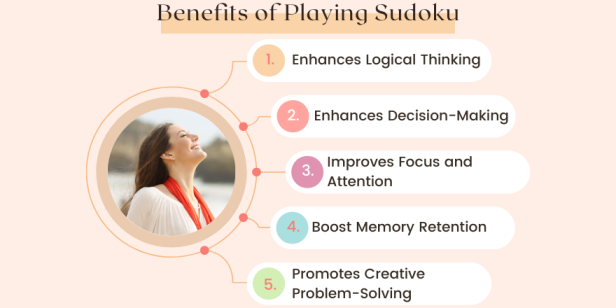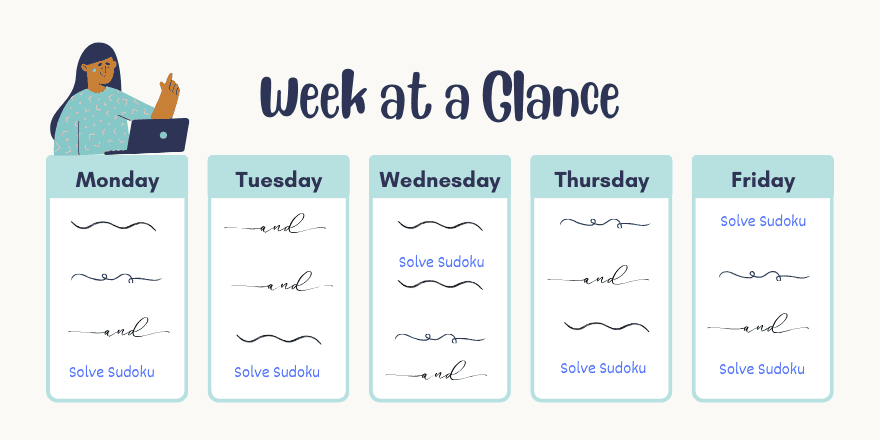Table of Contents
- Introduction
- A Quick Refresher: Sudoku and How to Start Playing
- The Cognitive Benefits of Sudoku
- Enhances Logical Thinking and Decision-Making
- Improves Focus and Attention
- Boosts Memory Retention
- Promotes Creative Problem-Solving
- The Emotional and Psychological Perks of Sudoku
- Reduces Stress and Enhances Relaxation
- Builds Confidence and Patience
- Keeps Your Brain Active and Young
- Why Sudoku Stands Out Among Brain-Boosting Activities
- Simple Yet Challenging
- Portable and Convenient
- A Universal Game for All Ages
- Final Thoughts: Make Sudoku a Part of Your Routine
- FAQ
1. Introduction
In today’s busy world, finding activities that sharpen the mind while offering relaxation can feel like searching for a needle in a haystack. Enter Sudoku. This classic puzzle game isn’t just about filling grids; it’s about nurturing your mental well-being in the simplest way possible. Whether you’re solving puzzles on paper, apps, or websites like SudokuStation.com, the benefits extend far beyond the game itself.
2. A Quick Refresher: Sudoku and How to Start Playing
If you’ve ever dabbled in Sudoku, you already know it’s a grid-based puzzle where numbers are placed logically. For those who are new, here’s the gist: each row, column, and smaller box within the grid must contain the numbers 1 through 9—no repeats allowed.
Getting started is easier than learning a new card trick. Begin with easier puzzles to build your confidence. As you improve, explore harder challenges to truly stretch your brain. With options available everywhere—from newspapers to websites like SudokuStation.com—you’re never far from your next puzzle.
3. The Cognitive Benefits of Sudoku

Enhances Logical Thinking and Decision-Making
Have you ever struggled to connect the dots in a complex situation? Sudoku trains your brain to find logical connections quickly. Each puzzle forces you to analyze possibilities and choose the best outcome. Over time, these skills naturally spill over into your daily life. Whether you’re planning a trip or tackling a work problem, your improved decision-making will shine.
Improves Focus and Attention
In a world full of distractions, Sudoku demands your undivided attention. By concentrating on finding the right numbers, you’re teaching your brain to stay present. This finely tuned focus can make other tasks—like reading or working—feel less daunting.
Boosts Memory Retention
When solving a puzzle, you’re constantly juggling possibilities and recalling prior moves. This back-and-forth action exercises your working memory. Think of it as weightlifting for your brain. Over time, this mental workout strengthens your ability to remember and manage information.
Promotes Creative Problem-Solving
Sudoku isn’t just numbers; it’s a mental dance of trial and error. As you solve puzzles, you’re forced to approach problems from multiple angles. This boosts creativity and resilience, skills that come in handy when life throws you a curveball.
4. The Emotional and Psychological Perks of Sudoku

Reduces Stress and Enhances Relaxation
There’s something deeply satisfying about losing yourself in a Sudoku puzzle. It’s like pressing pause on your worries. By focusing solely on the grid, you create a mental oasis—a place where stress melts away.
Builds Confidence and Patience
Few things match the thrill of solving a challenging puzzle. Each success reminds you of your capabilities. Plus, Sudoku teaches patience. Stuck on a grid? Take a breath, revisit your approach, and savor the joy of figuring it out.
Keeps Your Brain Active and Young
Think of Sudoku as brain yoga. Regular play stimulates neural connections, keeping your mind agile. For older adults, this mental stimulation can be particularly beneficial, potentially slowing cognitive decline and sharpening memory.
5. Why Sudoku Stands Out Among Brain-Boosting Activities
Simple yet Challenging
Sudoku strikes a delicate balance. It’s easy to understand but endlessly engaging. You don’t need fancy equipment or lengthy instructions—just a willingness to think.
Portable and Convenient
Got five minutes? That’s enough time for a quick puzzle. Sudoku’s portability makes it perfect for waiting rooms, commutes, or lazy Sunday mornings. And with platforms like SudokuStation.com, your next challenge is just a click away.
A Universal Game for All Ages
From kids sharpening their math skills to seniors keeping their minds active, Sudoku caters to everyone. It’s a rare activity that bridges generations, offering something for all skill levels.
6. Final Thoughts: Make Sudoku a Part of Your Routine

Life’s too short to let your brain sit idle. Sudoku offers an effortless way to stay sharp, reduce stress, and have fun. Whether you’re tackling puzzles for a few minutes each day or making it a weekend ritual, the benefits are undeniable. So, grab a grid, challenge your mind, and discover the joys of Sudoku for yourself.
FAQ
1. Can playing Sudoku really improve memory?
Absolutely! Sudoku exercises your working memory by requiring you to keep track of the potential number placements and strategies. Over time, this boosts your ability to remember and manage information.
2. Is Sudoku good for mental health?
Yes, it’s great for mental health. The focused nature of the game helps reduce stress while solving puzzles boosts confidence and provides a sense of accomplishment.
3. How often should I play Sudoku to see the benefits?
Even 10-15 minutes a day can make a difference. Regular practice keeps your brain engaged and strengthens cognitive skills.
4. Is Sudoku suitable for kids?
Definitely! Sudoku helps kids develop logical thinking, concentration, and problem-solving skills. Just start them with simpler puzzles. Here is a book especially for kids.
5. Can Sudoku prevent cognitive decline?
While it’s not a cure-all, Sudoku stimulates the brain and may help slow cognitive decline, especially in older adults, by keeping neural pathways active.
